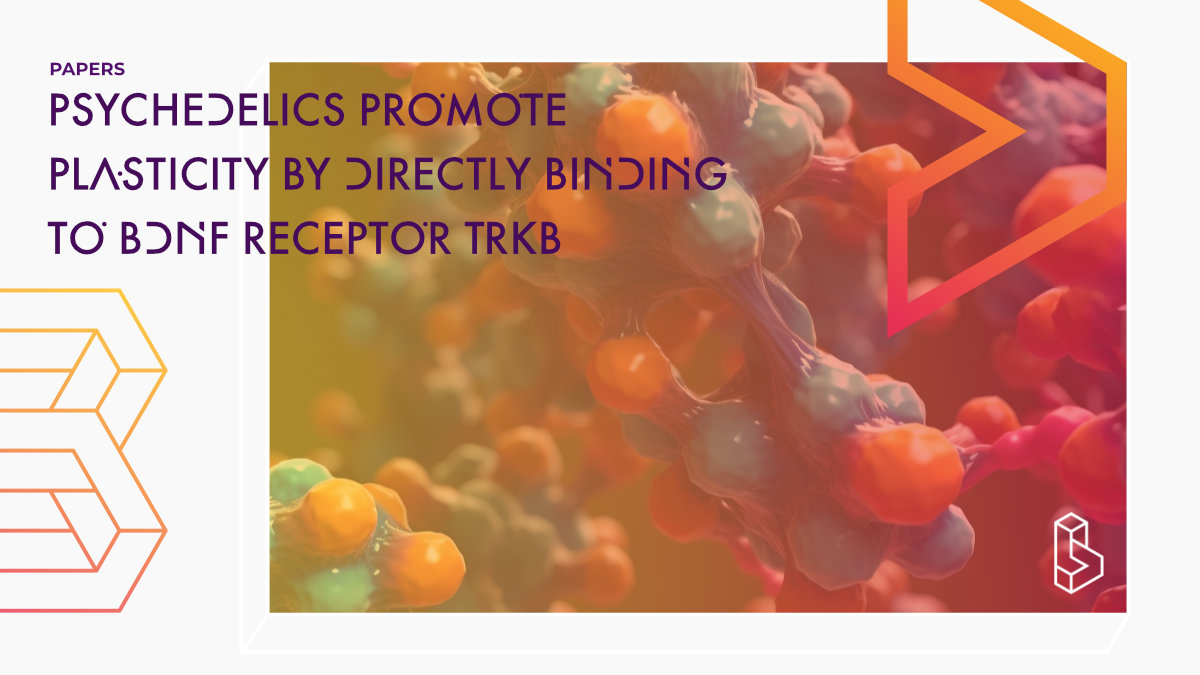This mice study investigated the antidepressant and neuroplastic effects of psychedelics, specifically lysergic acid diethylamide (LSD) and psilocin. The trial centres around their high-affinity binding to TrkB, a BDNF receptor implicated in antidepressant mechanisms. These substances bind to TrkB with affinities 1,000-fold higher than other antidepressants (SSRIs), and their effects on neurotrophic signalling, plasticity, and antidepressant-like behaviour in mice depend on this TrkB binding and promotion of endogenous BDNF signalling. Interestingly, these effects are independent of serotonin (5-HT) 2A receptor activation, suggesting that TrkB is a primary target for antidepressants.
Abstract of Psychedelics promote plasticity by directly binding to BDNF receptor TrkB
“Psychedelics produce fast and persistent antidepressant effects and induce neuroplasticity resembling the effects of clinically approved antidepressants. We recently reported that pharmacologically diverse antidepressants, including fluoxetine and ketamine, act by binding to TrkB, the receptor for BDNF. Here we show that lysergic acid diethylamide (LSD) and psilocin directly bind to TrkB with affinities 1,000-fold higher than those for other antidepressants, and that psychedelics and antidepressants bind to distinct but partially overlapping sites within the transmembrane domain of TrkB dimers. The effects of psychedelics on neurotrophic signaling, plasticity and antidepressant-like behavior in mice depend on TrkB binding and promotion of endogenous BDNF signaling but are independent of serotonin 2A receptor (5-HT2A) activation, whereas LSD-induced head twitching is dependent on 5-HT2A and independent of TrkB binding. Our data confirm TrkB as a common primary target for antidepressants and suggest that high-affinity TrkB positive allosteric modulators lacking 5-HT2A activity may retain the antidepressant potential of psychedelics without hallucinogenic effects.”
Authors: Rafael Moliner, Mykhailo Girych, Cecilia A. Brunello, Vera Kovaleva, Caroline Biojone, Giray Enkavi, Lina Antenucci, Erik F. Kot, Sergey A. Goncharuk, Katja Kaurinkoski, Mirjami Kuutti, Senem M. Fred, Lauri V. Elsilä, Sven Sakson, Cecilia Cannarozzo, Cassiano R. A. F. Diniz, Nina Seiffert, Anna Rubiolo, Hele Haapaniemi, Elsa Meshi, Elina Nagaeva, Tiina Öhman, Tomasz Róg, Esko Kankuri, Marçal Vilar, Markku Varjosalo, Esa R. Korpi, Perttu Permi, Konstantin S. Mineev, Mart Saarma, Ilpo Vattulainen, Plinio C. Casarotto & Eero Castrén
Summary of Psychedelics promote plasticity by directly binding to BDNF receptor TrkB
Depression has surged during the past decade, especially among young individuals. However, the acute hallucinogenic effects of psychedelics have restricted their widespread clinical use, as they require specialized medical supervision during prolonged sessions set in a controlled clinical environment.
The authors confirmed that LSD, PSI and lisuride bind to TrkB using microscale thermophoresis (transport due to temperature), and that LSD specifically perturbs the TrkB TMD dimer upon addition of LSD. This suggests that the TrkB TMD dimer is a high-affinity primary target for psychedelics.
Also see reporting on this study at Science.
Find this paper
Psychedelics promote plasticity by directly binding to BDNF receptor TrkB
https://doi.org/10.1038/s41593-023-01316-5
Open Access | Google Scholar | Backup | 🕊
Cite this paper (APA)
Moliner, R., Girych, M., Brunello, C. A., Kovaleva, V., Biojone, C., Enkavi, G., ... & Castrén, E. (2023). Psychedelics promote plasticity by directly binding to BDNF receptor TrkB. Nature Neuroscience, 26(6), 1032-1041.
Study details
Compounds studied
Psilocybin
LSD
Topics studied
Neuroscience
Study characteristics
Animal Study
Bio/Neuro

